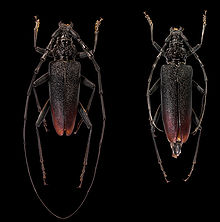Cerambyx cerdo, commonly known as the great capricorn beetle or cerambyx longicorn, is a species of beetle in family Cerambycidae. It occurs in North Africa (Algeria, Morocco, and Tunisia), Europe (Austria, Belarus, Bulgaria, Croatia, the Czech Republic, North Macedonia, France, Georgia, Germany, Hungary, Italy, Moldova, Poland, Portugal, Romania, Serbia, Slovakia, Spain, Sweden, Switzerland, and Ukraine), and Asia (Armenia, Azerbaijan, Georgia, Iran, and Turkey).[1]
| Cerambyx cerdo | |
|---|---|

| |
| Male (left) and Female (right) | |
| Scientific classification | |
| Domain: | Eukaryota |
| Kingdom: | Animalia |
| Phylum: | Arthropoda |
| Class: | Insecta |
| Order: | Coleoptera |
| Family: | Cerambycidae |
| Genus: | Cerambyx |
| Species: | C. cerdo
|
| Binomial name | |
| Cerambyx cerdo | |

| |
| European distribution of C. cerdo | |
| Synonyms | |
| |
The beetle was previously present in the United Kingdom but went locally extinct at least hundreds of years ago. Preserved specimens have been found in the UK, having been dated to around 4000 years old.[2][3]
Description
editThis beetle measures between 41 and 55 mm in body length and is among the largest of the European beetle species. It has an elongated, robust body and, like all members of the longhorn family, it has long antennae. In males, these thread-like antennae are longer than the body, but in females they are only as long as the hard wing cases (the elytra). The legs and body are black, except for the elytra which are reddish-brown towards the tips.[4]
Photogallery
edit-
Male specimen
-
Female specimen
-
Front view of a female
References
edit- ^ a b World Conservation Monitoring Centre (1996). "Cerambyx cerdo". IUCN Red List of Threatened Species. 1996: e.T4166A10503380. doi:10.2305/IUCN.UK.1996.RLTS.T4166A10503380.en. Retrieved 15 November 2021.
- ^ Osterloff, Emily. "Out of the woodwork: the great capricorn beetle". nhm.ac.uk. Natural History Museum. Retrieved 28 January 2021.
- ^ Amos, Jonathan (28 January 2021). "Bog beetles finally reveal their remarkable age". bbc.co.uk. BBC News. Retrieved 28 January 2021.
- ^ "Cerambyx longicorn (Cerambyx cerdo)". ARKive. Archived from the original on 5 December 2008.
External links
edit- Media related to Cerambyx cerdo at Wikimedia Commons
- Data related to Cerambyx cerdo at Wikispecies
- LIFE Rosalia: Cerambyx cerdo
